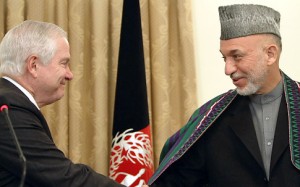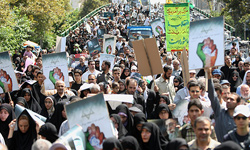Iraq: Obama and A Meaningless Date of Withdrawal (Packer)
 Sunday, September 5, 2010 at 9:46
Sunday, September 5, 2010 at 9:46  George Packer writes in The New Yorker:
George Packer writes in The New Yorker:What President Obama called the end of the combat mission in Iraq is a meaningless milestone, constructed almost entirely out of thin air, and his second Oval Office speech marks a rare moment of dishonesty and disingenuousness on the part of a politician who usually resorts to rare candor at important moments. The fifty thousand troops who will remain in Iraq until the end of next year will still be combat troops in everything but name, because they will be aiding one side in an active war zone. The proclaimed end of Operation Iraqi Freedom has little or nothing to do with the military and political situation in Iraq, which is why Iraqis were barely aware when the last U.S. combat brigade crossed into Kuwait a few days ago. And for most of us, too—except, perhaps, those with real skin in the game, the million and a half Iraq war veterans and their families—there’s hardly any reality or substance to the moment.
Iraq: Obama Wants Us to Forget the Lessons (Bacevich)
It’s hard to have an honest emotional response or even know what one feels. After seven years of war, the occasion deserves some weight of feeling, but many Americans stopped paying attention a long time ago. And that’s exactly why the President made his announcement: because Americans want the war to be over, have wanted it for years. Tonight he told us what we wanted to hear. August 31, 2010, will go down in history as the day Americans could start not thinking about the war without feeling guilty.
This is not entirely ignoble, by the way. The war has gone on for a long time—almost as long as the Civil War and America’s part in the Second World War combined—and it has taken a heavy toll on the one half of one per cent of Americans who have fought it, and in a democracy this is an intolerable situation. A checked-out public, a stressed-out military, a war hardly anyone can explain: at some point it had to be declared over, and only the President could do it, and Obama is the President, and he was as good as his word in so declaring it on August 31, 2010, not a day sooner or later. He can claim full credit for sticking to his own date certain regardless of circumstances—for not postponing the artificial event that just happened until some future date certain. And in doing so, he restored a small measure of democratic credibility here at home. This is what it looks like when a wartime President is true to his word and the people are behind him. Strange, that it doesn’t look better than it does.
For almost all purposes, Iraq has no government. Almost six months after national elections, the country’s politicians remain unable to compromise and cut a deal, showing the persistent lack of maturity and vision that has earned the political class the justifiable contempt of the Iraqi public. Meanwhile, Iraq’s neighbors are playing their proxies against one another and jostling for a piece of the action. In the vacuum, Sunni extremists are showing just how much—and how little—Iraqi security forces are going to be capable of in the post-American-combat-mission era. It’s not a very encouraging picture. Even if a return to civil war or a military coup, or both, doesn’t happen in the near future, Iraq remains fragile and extremely violent. Daily life—electricity, water, security, the same things Iraqis have been complaining about since 2003—is pretty hellish for most Iraqis. Read the comments from Iraqis in these New York Times interviews. They show the same range of views, some of them within a single individual, that one heard throughout the war. There is great disappointment in and resentment of America, but only one expression of pure hatred, and a fair number affirmations that, at least, Iraqis have been allowed to join the world and enjoy a margin of freedom. Almost all of them fear the future and can only imagine a normal life years or decades from now (fifty years is a common marker). Many of them (especially in Sunni areas), as much as they dislike the occupation, dislike more the prospect of a return to the levels of chaos seen in 2006, which could accompany an American withdrawal. It’s a real possibility, and August 31, 2010 was actually not such a good choice for the end of the combat mission. March 31, 2010, right after the elections, would have been better.
And then there are the hundreds of thousands, the millions, of Iraqis who have fled the country and not yet deemed it in their interest to go back. Among them is the core of the country’s educated, secular-minded middle class, including the younger generation—those who had the most to gain by the American invasion. It’s going to be much harder for Iraq to build itself into a stable, modern country without them.
And yet, to hear the President tell it, Iraq is on the right path and in a surprisingly good position to take its destiny in hand. Those passages from the speech remind me of nothing so much as the fatuously optimistic updates one regularly heard from President Bush and others in the earlier years of the war. Whatever Iraqis said, whatever the evidence of one’s senses, things were always getting better (though “challenges” always remained). And, as it turns out, as of August 31, 2010, this is still the case. As a candidate, Obama was in a position to tell the truth about Iraq, and he did. As President, he’s learned the official language of euphemism and vagueness and distortion. Administration officials who, three years ago and not yet in power, were withering in their assessment of the war and Iraqi politicians, have become their unlikely boosters.
The language of Obama’s speech was as flat and forgettable as anything we’ve heard from him. Unlike Bush’s “major combat operations are over” address in 2003 (which came to be known as the “mission accomplished” speech), Obama’s “the combat mission is over” in 2010 failed to carry conviction—evidence of this President’s intelligence, if not his forthrightness. When he talks about Afghanistan, he thinks about what he’s saying, and as a result he says real things in a way that penetrates, even—or especially-—when he avoids grandiosity, as in his speech last December at West Point. On Iraq, he seemed to be trying not to think too hard about what he was saying, while sprinkling his words with a grandiose coating. Otherwise, he might have had to admit—among other things—that he strongly opposed the surge that his speech praised.
O.K.—why should we expect him to be that much better than any other politician? Presidents never admit they were wrong. (Bush turned the refusal into a badge of honor.) We know how much credit honesty would have gained him among his opponents. John Boehner’s speech on Iraq (which, though it preceded Obama’s by a few hours, was a kind of Republican response) proved that the opposition has no interest in Iraq, except as yet another weapon to use against Obama. So Boehner wants Obama to declare victory, and he suggested that it’s unpatriotic not to do so—Boehner, who couldn’t pronounce General Ray Odierno’s name.
There is no American victory in Iraq, and there is not going to be any American victory in Iraq, and Obama was right not to talk about V-I. There isn’t even a clear truce, with a D.M.Z. and a southern half that, under American protection, might evolve into an economic powerhouse and a liberal democracy. In the Times Tuesday, Paul Wolfowitz proposed South Korea as a model for Iraq. The analogy is closer than Vietnam or the Second World War, but it still fails the test of commensurateness—among other reasons, because there will not be tens of thousands of American troops in Iraq sixty years from now, or even two years from now. We are leaving, undefeated and unvictorious—we are leaving it to the Iraqis....
Read full article....





